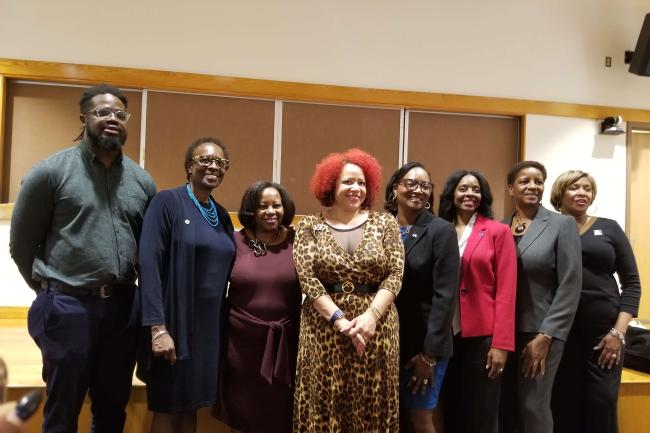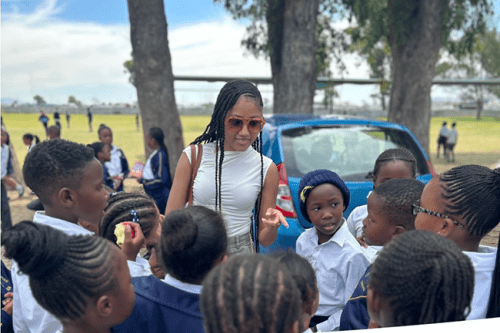WASHINGTON – On Tuesday, October 29, 2019, New York Times Staff Writer and McArthur Winner Nikole Hannah-Jones came to Howard University to speak about her latest work, the New York Times Magazine’s 1619 Project. This project is an in-depth analysis of the legacy of slavery that still persists today. It seeks to connect the past and the present from the origins of slavery to its ever-present effects on today’s society. This event was held in the Howard University Hospital and organized by the Howard University Chapter of the Ida B. Wells Society, the first and only student chapter of the society; the Howard University Association of Black Journalists (HUABJ); and Cathy Hughes School of Communications faculty.
The event began with introductions by Howard University professor Ingrid Sturgis who introduced School of Communications Dean Gracie Lawson-Borders; Donovan Thomas, president of the Ida B. Wells Society; and Julia Weng, president of HUABJ; and Ann Peters of the Pulitzer Center. Professor Sturgis then introduced Nikole Hannah-Jones and moderator for the event, Professor Yanick Rice Lamb.
Hannah-Jones began by discussing how she got her project off the ground. To the surprise of many in the audience, she said that everyone at the magazine supported her project and she didn’t have much trouble getting it off the ground. She said, “I don't think I've ever seen the magazine staff so excited about working with a single issue.”
While explaining the 1619 Project, Hannah-Jones discussed how slavery still effects society today. She stated that all the essays in the magazine prove that slavery cannot be left in the past because its effects still linger today. Hannah-Jones went on to say, “…you can look all across about modern American life, and almost nothing culturally, politically, socially, economically has been left untouched by our decision to engage in racialized chattel slavery.” To further expand on this point, throughout the 1619 Project, Nikole Hannah-Jones was able to link slavery and the anti-black racism that developed it to things such as traffic jams, the system of capitalism, and even the fact that the United States is the only industrialized nation without universal healthcare.
One myth that Nikole Hannah-Jones sought to dispel with this project was the idea that a person’s ancestors had to own slaves in order to benefit from slavery. She dispelled this misconception by elaborating on how slave labor supported the whole American economy. For example, during the industrial revolution, poor white factory workers had jobs because slaves picked the cotton that was used in the factories.
Another key aspect of Hannah-Jones’ 1619 Project was that she wanted it to be a reason for black people to be proud of their history. When speaking about the magazine, she said, “That the actual object that you hold yourself would be the testament to the fact that no matter what this country tried to do to us. We survived and we are able to tell that story.” She later goes onto explain how black people are more American than anyone else because, once stripped of their culture, they had to create a new one.
Nikole Hannah-Jones even went as far as arguing in one of her essays that black people were the real Founding Fathers of America. She said this because the white Founding Fathers owned slaves, which meant they weren’t true to the words outlined in the declaration of independence. However, black people truly believed in the ideals that America was built on, the belief that all people were created equal and deserved equal rights. Hannah-Jones summed this point up best by saying, “That's a beautiful thing to be seen as the bottom but actually be the true Founding Fathers of the country.”
The event concluded with a Q & A session with the audience where someone asked Nikole Hannah-Jones how she deals with the argument that some people may say she’s biased in her work as a member of the black community. She responded by saying, “Every journalist is biased. Every single one. If you don't have an opinion on something, it’s because you don't know enough about it to have an opinion. As soon as you know enough about it, you have thoughts on it… What matters is are my facts correct? Am I fair?” She then went on to say, "Neutrality is a luxury for reporters, who are reporting in a country built for them. It is not a luxury that journalists of color have. And I don't think it's something that we should aspire to.”
More information about the 1619 Project can be found at https://www.nytimes.com/interactive/2019/08/14/magazine/1619-america-slavery.html
###
(Featured photo: On October 29, 2019, the Cathy Hughes School of Communications hosted New York Times Staff Writer and McArthur Winner Nikole Hannah-Jones for the event, “Reframing our History: The 1619 Project.” - photo courtesy of Brandon Oliver/Howard University)
About Howard University
Founded in 1867, Howard University is a private, research university that is comprised of 13 schools and colleges. Students pursue studies in more than 120 areas leading to undergraduate, graduate and professional degrees. The University operates with a commitment to Excellence in Truth and Service and has produced four Rhodes Scholars, 11 Truman Scholars, two Marshall Scholars, one Schwarzman Scholar, over 70 Fulbright Scholars and 22 Pickering Fellows. Howard also produces more on-campus African-American Ph.D. recipients than any other university in the United States. For more information on Howard University visit www.howard.edu
Media Contact: Imani Pope-Johns, Imani.popejohns@howard.edu





